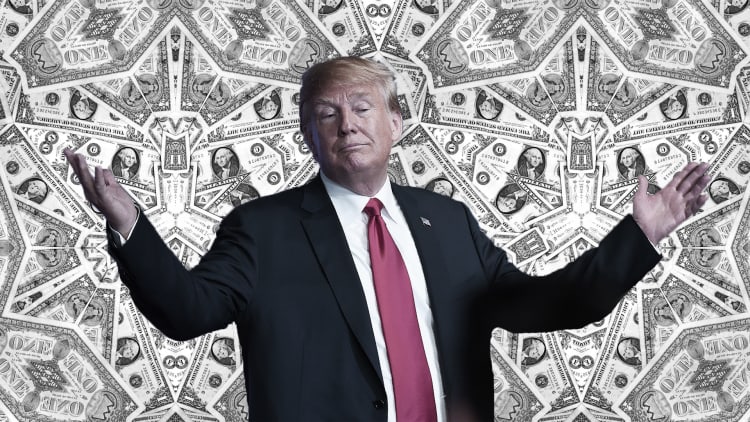Democrats are promising new scrutiny of corporate America's biggest names as they expand their power on Capitol Hill.
In the week since the midterm election, Democratic lawmakers have vowed to launch inquiries into publicly traded companies with ties to President Donald Trump and his top lieutenants, including Deutsche Bank, Boeing, and AT&T. They plan to seek answers directly from pharmaceutical CEOs on the cost of prescription drugs. And they want to turn up the pressure on consumer-facing companies like Wells Fargo, Equifax and payday lenders.
"To appeal to the Democratic base right now requires them to at least posture as though they're going to meaningfully contest corporate power," said David Segal, executive director of Demand Progress, a liberal advocacy group.
The combative approach is partly an outgrowth of Democrats' strategy of maximizing their oversight authority in the House once they wield the gavel. With Republicans in control of the White House and Senate, Democrats have little chance of passing meaningful legislation. Instead, they're doubling down on accountability for the Trump administration — and business provides a back door.
Rep. Maxine Waters, D-Calif., expected to become chairwoman of the House Financial Services Committee, is seeking information from Deustche Bank, a lender to the Trump Organization. Rep. Adam Schiff, D-Calif., the likely chairman of the House Intelligence Committee, told Axios he wants to re-examine Trump's role in blocking AT&T's merger with Time Warner.
In the Senate, a quartet of Democrats — including potential presidential candidates Cory Booker of New Jersey and Elizabeth Warren of Massachusetts — are spotlighting Commerce Secretary Wilbur Ross' meetings with Chevron, Boeing, and Greenbrier last year while he reportedly held stakes in those companies.
"Those meetings raise questions about Secretary Ross's compliance with criminal federal conflict of interest statutes," they wrote in a letter to the agency's ethics office.
Democrats also want to test how an aggressive stance toward big business might play among voters as they eye the 2020 presidential elections. Exit polls showed health care was the top issue in the midterms, and Democrats intend to make investigating pharmaceutical companies a top priority.
"Health care and the cost of prescription drugs are why I ultimately decided to run," incoming Democratic Rep. Elissa Slotkin of Michigan told CNBC. "We are not settled as a nation on how we're going to provide health care to our people, and we need to make it affordable."
Rob Kelner, an attorney with Covington & Burling, said Democrats have sent roughly 100 letters during the past two years to companies in four main sectors: pharmaceuticals, tech, energy and financial services. Now, they're more likely to get answers.
"Prepare, prepare, prepare," Kelner said he tells his clients. "Don't wait to get hit on the head with a 2-by-4 before you get your ducks in a row."
Kelner said tech and social media companies are likely to face heightened scrutiny as bipartisan consensus builds to rein in their reach and increase transparency. Democrats could also target energy companies as a counterweight to the administration's deregulatory agenda and dismissal of climate change. And Waters has been open about her top corporate targets if she takes over the financial services committee: Equifax, over its massive data breach, and Wells Fargo, over its fraudulent accounts.
"Americans are concerned about the state of our country, particularly their economic security, and they have given Democrats a mandate to support that call for change," she wrote in a letter to colleagues last week and obtained by CNBC.
Some liberal groups are pushing Democrats to go even further. Demand Progress is calling for nominees with extensive backgrounds in consumer protection to fill vacancies at regulatory agencies, such as the Securities and Exchange Commission and the Federal Communications Commission. Those agencies are headed by bipartisan commissions, and Democrats are allowed to choose their nominees.
Jeff Hauser, director of the Revolving Door Project, also is encouraging Democrats to cast a wide net across corporate America. He urged the party to issue subpoenas to businesses ranging from hedge fund Renaissance Technologies, which has close ties to the Trump administration and is locked in a legal battle with the IRS, to embattled retailer Sears, whose chief executive was Treasury Secretary Steven Mnuchin's college roommate.
"Democrats need to develop a consistent political brand," Hauser said. "In this populist moment, the Democrats' best opportunity to brand themselves is as the political party that fights the worst excesses of corporate America on behalf of ordinary Americans."
— CNBC's Karen James and Janhvi Bhojwani contributed to this report.
WATCH: Trump's economy: Here's where he gets credit, and what could go wrong


